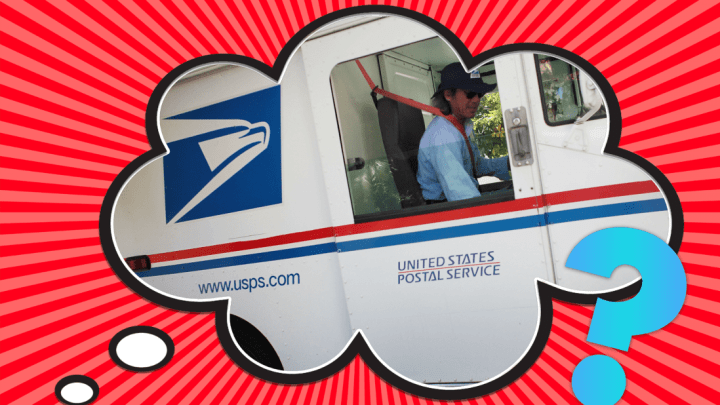Why Can't You Start a Rival Post Office?
By Ethan Trex

With the holiday season quickly approaching, many of us are bracing ourselves for the inevitable interminable trips to the post office that come along with mailing cards and gifts. Whenever I’m stuck in the long line waiting, I always wonder, “Why couldn’t someone create a private postal system to compete with this one?”
The short answer: It would be illegal for a private company to carry normal letters. Let’s take a look at the question in a bit more depth, though.
What are the Private Express Statutes?
Basically, the Private Express Statutes are a set of laws, some of which date all the way back to 1792, that establish the USPS’s exclusive right to deliver letters in exchange for compensation. From the USPS’s point of view, these laws are necessary to keep private courier services from leeching away business on the most profitable routes and leaving the government to deliver mail on the most expensive routes that usually turn a net loss.
Any loopholes around these rules?
Sure. The USPS explicitly says that it doesn’t mind if you use a private courier to deliver your mail…provided you put the proper USPS postage on the letter in question and cancel the postage in ink. In other words, they’ll magnanimously sell you a stamp and let you cancel it without actually using it for postage.
There are other more useful exceptions too. You can ship a letter using a private courier like FedEx if it’s “extremely urgent” or if the rate you pay to send it is at least six times the current price of USPS first class postage. You can also carry (or have one of your employees carry) your own letters to their recipients without running afoul of the Postmaster General.
How do bike messengers stay on the right side of the law, then?
Although the USPS wants to protect its monopoly, it does concede some points to common sense. There’s an exception in the Private Express Statutes that allows for businesses to send “25 or fewer letters carried by special messenger on an infrequent, irregular basis for the sender or addressee.” In other words, bike messengers are in the clear.
So it’s illegal to ship certain types of letters through private couriers. Surely these rules aren’t enforced, right?
Scofflaws beware! The USPS actually enforces these rules from time to time. For example, Equifax learned a terrifying lesson in 1993. Armed USPS inspectors raided the company’s Atlanta headquarters to determine whether or not the letters the company had been sending via FedEx were indeed “extremely urgent” as required by the Private Express Statutes. The letters didn’t pass the test, and Equifax ended up having to pay a $30,000 fine.
Any other mail laws we’re probably breaking?
Yes, if you’ve ever slipped an unstamped leaflet or flyer into a mailbox. Title 18 of the United States Code prohibits the placement of any unstamped “mailable matter” into an approved mailbox regardless of whether or not the mailbox’s owner objects.
In the 1981 decision USPS v. Council of Greenburgh Civic Assns., the Supreme Court ruled that this system was legal and that customers don’t really have a say over what goes into their mailbox, even if they were just dying to get that new Chinese place’s menu. The ruling reads, “In effect, the postal customer, although he pays for the physical components of the 'authorized depository,' agrees to abide by the Postal Service's regulations in exchange for the Postal Service agreeing to deliver and pick up his mail.”
So nobody’s tried to create their own USPS competitor?
They sure have. Political radical and reformer Lysander Spooner did just that in 1844 by opening the American Letter Mail Company. Spooner felt that the postal monopoly was unconstitutional since the Constitution only gave Congress “the power to establish post offices and post roads” without mentioning any sort of exclusivity. Furthermore, Spooner was pretty sure he could beat the USPS on price; he aimed to cut the price of a stamp from 12 cents to a nickel.
Spooner was primarily interested in making a political point about the government’s anticompetitive behavior, but the American Letter Mail Company had quite a bit of early success. Spooner opened offices in major East Coast cities and used both ships and railroads to deliver letters in a timely, inexpensive fashion. Customers obviously loved the cut-rate prices and faster delivery times, and Spooner quickly became a worthy rival for the USPS.
Of course, the government didn’t make things easier for him. It tried to punish railroad owners who transported Spooner’s messengers, and Spooner even received threats of jail time for circumventing the government’s monopoly. He kept delivering mail, though, and eventually the USPS had to slash its own prices to keep up. The price of a stamp dropped all the way down to a nickel.
Spooner wasn’t finished, though. He lowered his rates again and kept mailing letters. By 1851 Congress finally had to intervene with new laws to protect the postal monopoly and another rate cut, this one down to three cents per stamp. The new measures finally put Spooner out of business, but his upstart postal service had helped reduce the price of stamps by 75 percent. In the meantime, other private carriers had been able to quietly pull in big profits of their own while Spooner had diverted the government’s attention.
Have you got a Big Question you'd like us to answer? If so, let us know by emailing us at bigquestions@mentalfloss.com.